【原创】专题07 非谓语动词专项训练 100 题-2025中考英语二轮专题复习(答题技巧+题目分类与分层)
文档属性
| 名称 | 【原创】专题07 非谓语动词专项训练 100 题-2025中考英语二轮专题复习(答题技巧+题目分类与分层) |
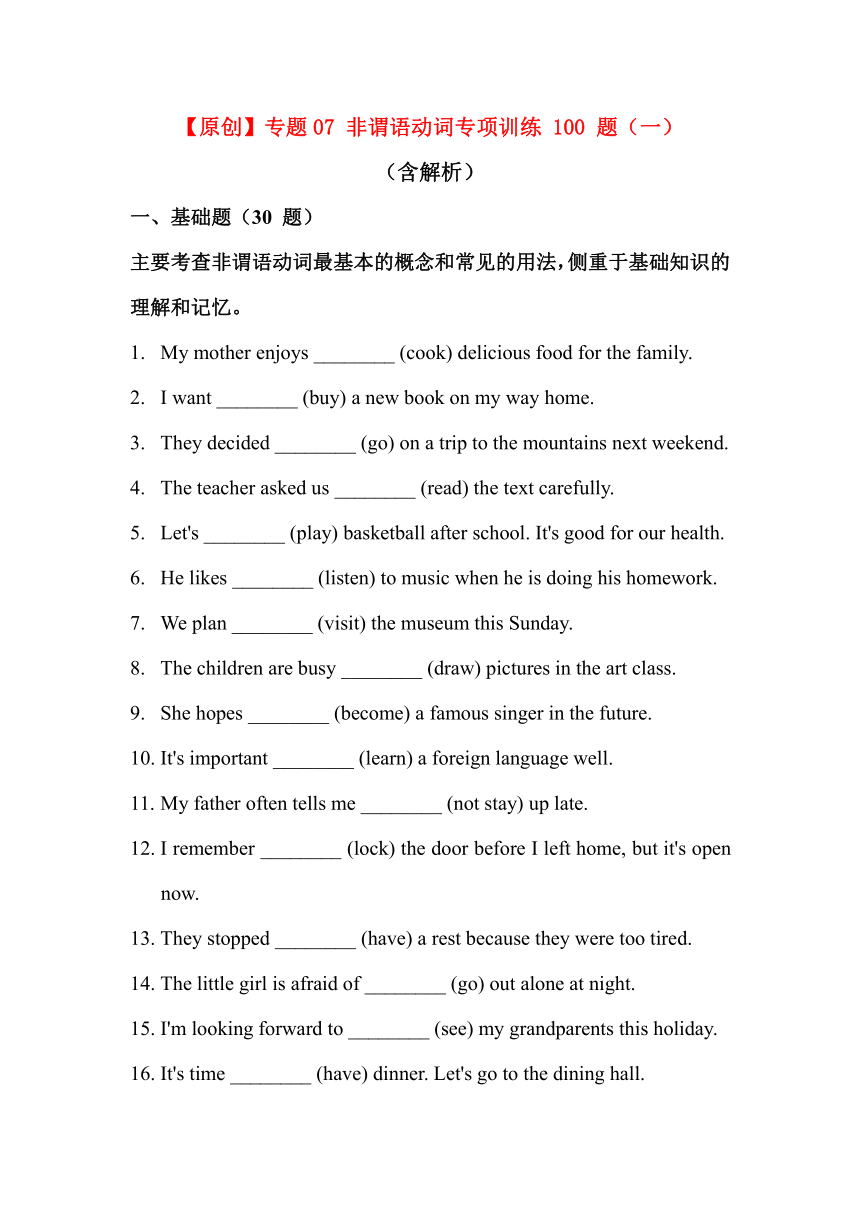
|
|
| 格式 | docx | ||
| 文件大小 | 22.8KB | ||
| 资源类型 | 试卷 | ||
| 版本资源 | 人教新目标(Go for it)版 | ||
| 科目 | 英语 | ||
| 更新时间 | 2025-02-28 00:00:00 | ||
图片预览

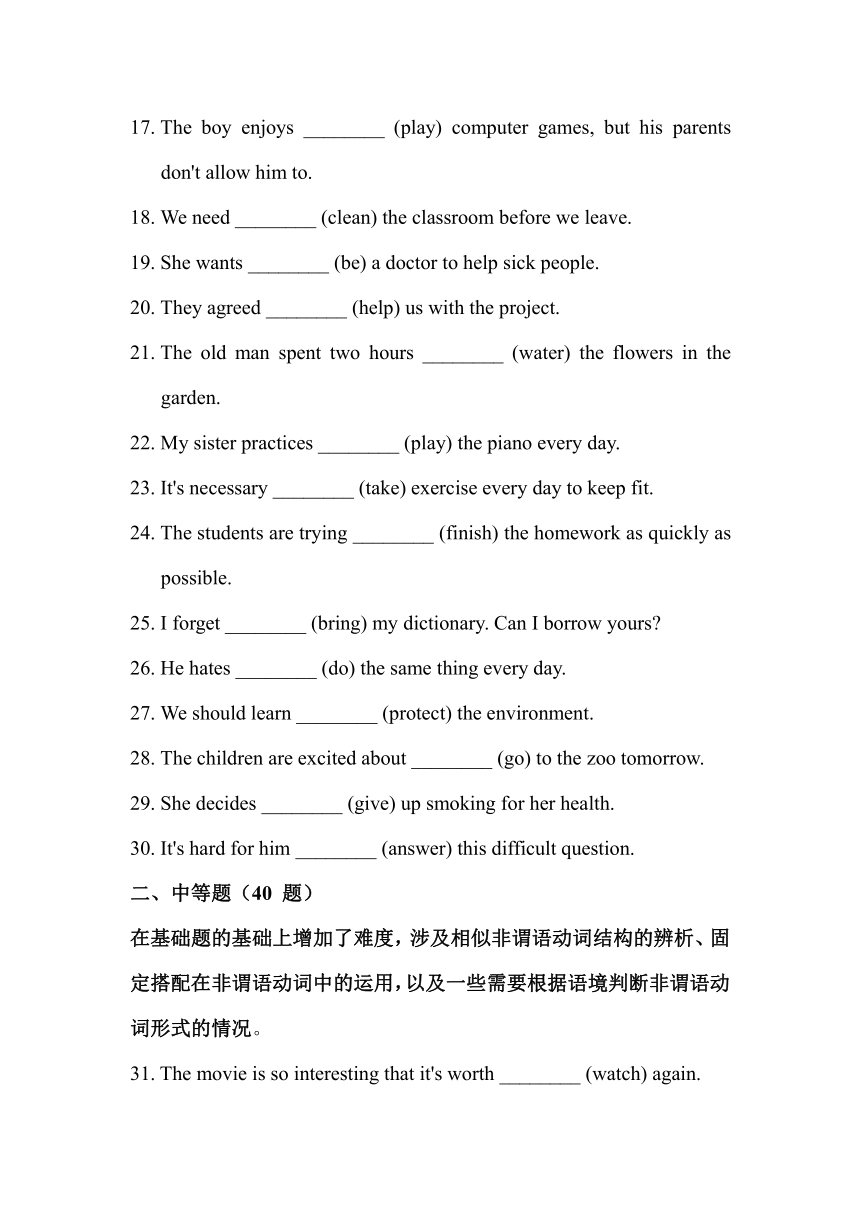
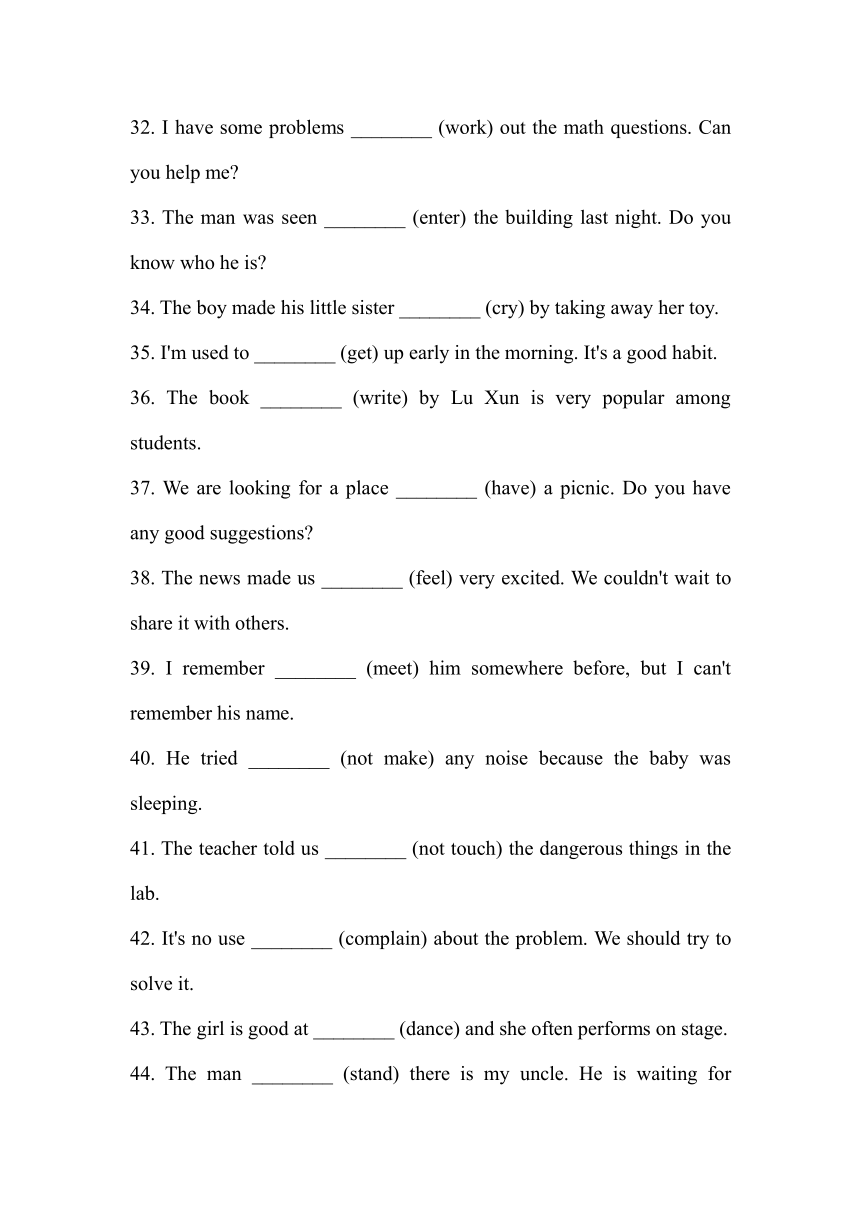
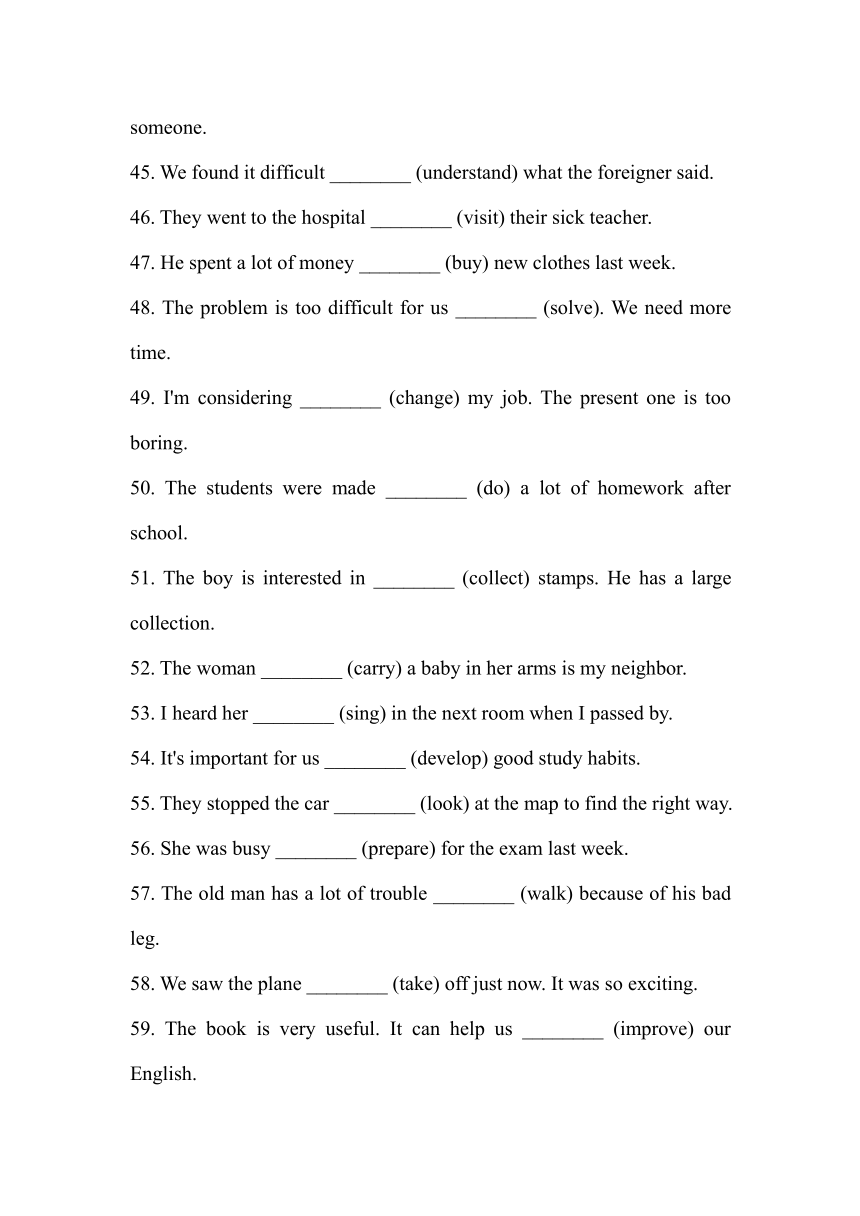
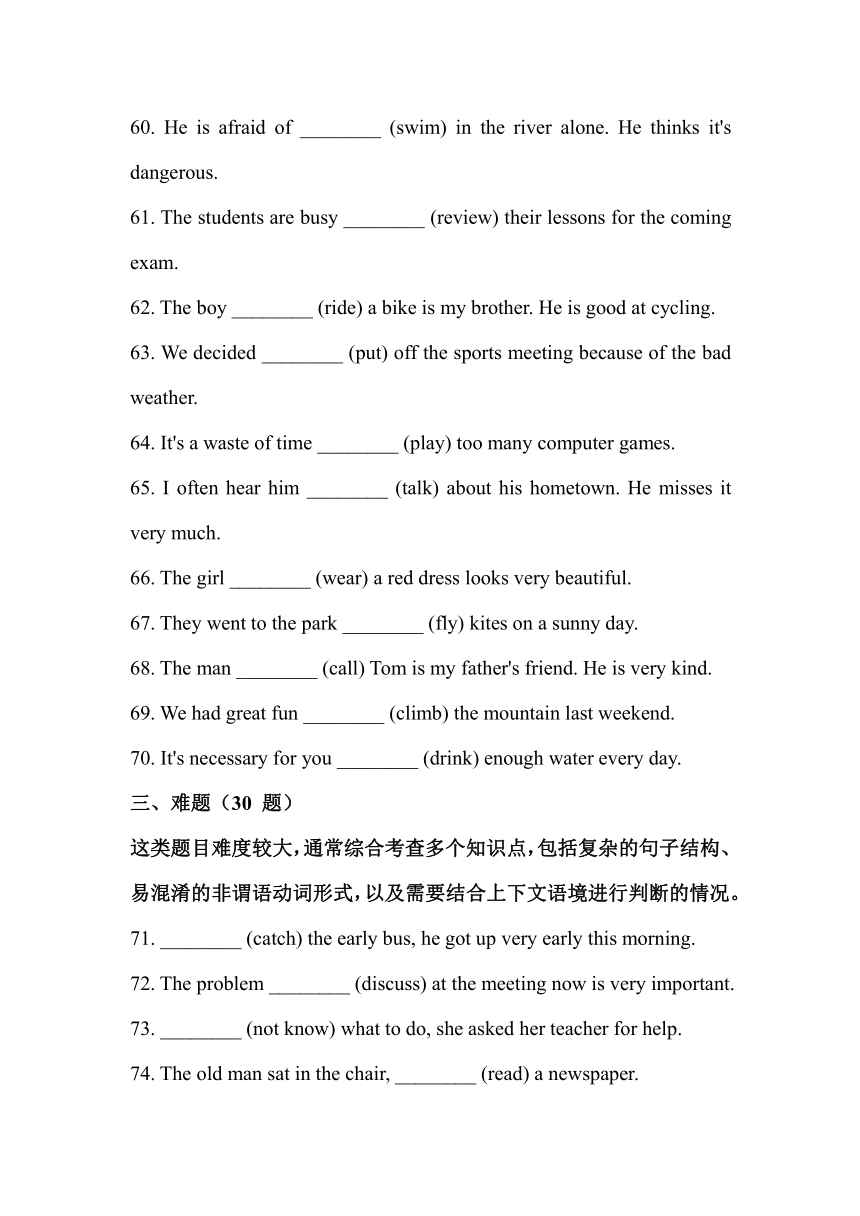
文档简介
【原创】专题07 非谓语动词专项训练 100 题(一)
(含解析)
一、基础题(30 题)
主要考查非谓语动词最基本的概念和常见的用法,侧重于基础知识的理解和记忆。
My mother enjoys ________ (cook) delicious food for the family.
I want ________ (buy) a new book on my way home.
They decided ________ (go) on a trip to the mountains next weekend.
The teacher asked us ________ (read) the text carefully.
Let's ________ (play) basketball after school. It's good for our health.
He likes ________ (listen) to music when he is doing his homework.
We plan ________ (visit) the museum this Sunday.
The children are busy ________ (draw) pictures in the art class.
She hopes ________ (become) a famous singer in the future.
It's important ________ (learn) a foreign language well.
My father often tells me ________ (not stay) up late.
I remember ________ (lock) the door before I left home, but it's open now.
They stopped ________ (have) a rest because they were too tired.
The little girl is afraid of ________ (go) out alone at night.
I'm looking forward to ________ (see) my grandparents this holiday.
It's time ________ (have) dinner. Let's go to the dining hall.
The boy enjoys ________ (play) computer games, but his parents don't allow him to.
We need ________ (clean) the classroom before we leave.
She wants ________ (be) a doctor to help sick people.
They agreed ________ (help) us with the project.
The old man spent two hours ________ (water) the flowers in the garden.
My sister practices ________ (play) the piano every day.
It's necessary ________ (take) exercise every day to keep fit.
The students are trying ________ (finish) the homework as quickly as possible.
I forget ________ (bring) my dictionary. Can I borrow yours
He hates ________ (do) the same thing every day.
We should learn ________ (protect) the environment.
The children are excited about ________ (go) to the zoo tomorrow.
She decides ________ (give) up smoking for her health.
It's hard for him ________ (answer) this difficult question.
二、中等题(40 题)
在基础题的基础上增加了难度,涉及相似非谓语动词结构的辨析、固定搭配在非谓语动词中的运用,以及一些需要根据语境判断非谓语动词形式的情况。
31. The movie is so interesting that it's worth ________ (watch) again.
32. I have some problems ________ (work) out the math questions. Can you help me
33. The man was seen ________ (enter) the building last night. Do you know who he is
34. The boy made his little sister ________ (cry) by taking away her toy.
35. I'm used to ________ (get) up early in the morning. It's a good habit.
36. The book ________ (write) by Lu Xun is very popular among students.
37. We are looking for a place ________ (have) a picnic. Do you have any good suggestions
38. The news made us ________ (feel) very excited. We couldn't wait to share it with others.
39. I remember ________ (meet) him somewhere before, but I can't remember his name.
40. He tried ________ (not make) any noise because the baby was sleeping.
41. The teacher told us ________ (not touch) the dangerous things in the lab.
42. It's no use ________ (complain) about the problem. We should try to solve it.
43. The girl is good at ________ (dance) and she often performs on stage.
44. The man ________ (stand) there is my uncle. He is waiting for someone.
45. We found it difficult ________ (understand) what the foreigner said.
46. They went to the hospital ________ (visit) their sick teacher.
47. He spent a lot of money ________ (buy) new clothes last week.
48. The problem is too difficult for us ________ (solve). We need more time.
49. I'm considering ________ (change) my job. The present one is too boring.
50. The students were made ________ (do) a lot of homework after school.
51. The boy is interested in ________ (collect) stamps. He has a large collection.
52. The woman ________ (carry) a baby in her arms is my neighbor.
53. I heard her ________ (sing) in the next room when I passed by.
54. It's important for us ________ (develop) good study habits.
55. They stopped the car ________ (look) at the map to find the right way.
56. She was busy ________ (prepare) for the exam last week.
57. The old man has a lot of trouble ________ (walk) because of his bad leg.
58. We saw the plane ________ (take) off just now. It was so exciting.
59. The book is very useful. It can help us ________ (improve) our English.
60. He is afraid of ________ (swim) in the river alone. He thinks it's dangerous.
61. The students are busy ________ (review) their lessons for the coming exam.
62. The boy ________ (ride) a bike is my brother. He is good at cycling.
63. We decided ________ (put) off the sports meeting because of the bad weather.
64. It's a waste of time ________ (play) too many computer games.
65. I often hear him ________ (talk) about his hometown. He misses it very much.
66. The girl ________ (wear) a red dress looks very beautiful.
67. They went to the park ________ (fly) kites on a sunny day.
68. The man ________ (call) Tom is my father's friend. He is very kind.
69. We had great fun ________ (climb) the mountain last weekend.
70. It's necessary for you ________ (drink) enough water every day.
三、难题(30 题)
这类题目难度较大,通常综合考查多个知识点,包括复杂的句子结构、易混淆的非谓语动词形式,以及需要结合上下文语境进行判断的情况。
71. ________ (catch) the early bus, he got up very early this morning.
72. The problem ________ (discuss) at the meeting now is very important.
73. ________ (not know) what to do, she asked her teacher for help.
74. The old man sat in the chair, ________ (read) a newspaper.
75. The woman ________ (question) by the police just now is a suspect.
76. ________ (give) more time, we will be able to finish the work better.
77. The boy was seen ________ (run) out of the classroom quickly when the teacher came in.
78. ________ (hear) the good news, they all jumped with joy.
79. The book ________ (write) in English is difficult for us to read.
80. The man ________ (stand) in front of the classroom is our new teacher.
81. The children went out of the classroom, ________ (talk) and laughing.
82. ________ (see) from the top of the hill, the city looks very beautiful.
83. The problem is far from ________ (settle). We need to think of more ways.
84. The girl ________ (lose) her way in the city was very worried.
85. ________ (not receive) a reply, he decided to write another letter.
86. The man ________ (injure) in the accident was sent to the hospital at once.
87. ________ (work) hard, and you will achieve your dream.
88. The students ________ (sit) in the front row can hear the teacher clearly.
89. The project ________ (complete) next month will be of great importance.
90. ________ (judge) from his appearance, he must be from the south.
91. The woman ________ (carry) a heavy box is my mother's friend.
92. ________ (finish) his homework, he went out to play football.
93. The problem ________ (solve) so far has saved us a lot of time.
94. The man ________ (wait) for the bus is my neighbor.
95. ________ (be) honest, I don't like this kind of music.
96. The boy ________ (laugh) at by his classmates felt very sad.
97. ________ (look) after the old people is our responsibility.
98. The book ________ (translate) into many languages has become very popular.
99. The students ________ (perform) on the stage are from our school.
100. ________ (not having) enough money, he couldn't buy the new bike he wanted.
答案解析
(一)基础题答案解析
cooking:enjoy doing sth. 是固定搭配,意为 “喜欢做某事”,所以用 cook 的动名词形式 cooking。
to buy:want to do sth. 表示 “想要做某事”,是常见的固定用法,因此用 to buy。
to go:decide to do sth. 意思是 “决定做某事”,所以填 to go。
to read:ask sb. to do sth. 为 “要求某人做某事”,这里用 to read。
play:Let's 后面接动词原形,构成 Let's do sth. 结构,意为 “让我们做某事”,所以用 play。
listening:like doing sth. 表示喜欢做某事,强调习惯性、经常性的动作,故用 listening。
to visit:plan to do sth. 表示 “计划做某事”,所以用 to visit。
drawing:be busy doing sth. 意为 “忙于做某事”,所以用 draw 的动名词形式 drawing。
to become:hope to do sth. 表示 “希望做某事”,因此用 to become。
to learn:It's + adj. + to do sth. 是常用句型,意为 “做某事是…… 的”,it 作形式主语,真正的主语是后面的动词不定式,所以填 to learn。
not to stay:tell sb. not to do sth. 表示 “告诉某人不要做某事”,所以用 not to stay。
locking:remember doing sth. 表示 “记得做过某事”,根据语境可知 “我记得离开家前锁了门”,所以用 locking。
to have:stop to do sth. 表示 “停下来去做另一件事”,他们停下来是为了休息,所以用 to have。
going:be afraid of doing sth. 表示 “害怕做某事”,所以用 going。
seeing:look forward to doing sth. 表示 “期待做某事”,其中 to 是介词,后面接动名词,所以用 seeing。
to have:It's time to do sth. 表示 “是做某事的时候了”,所以用 to have。
playing:enjoy doing sth. 喜欢做某事,所以用 playing。
to clean:need to do sth. 表示 “需要做某事”,所以用 to clean。
to be:want to be 表示 “想要成为”,所以用 to be。
to help:agree to do sth. 表示 “同意做某事”,所以用 to help。
watering:spend time (in) doing sth. 表示 “花费时间做某事”,in 可以省略,所以用 watering。
playing:practice doing sth. 表示 “练习做某事”,所以用 playing。
to take:It's necessary to do sth. 表示 “做某事是有必要的”,所以用 to take。
to finish:try to do sth. 表示 “努力做某事”,所以用 to finish。
to bring:forget to do sth. 表示 “忘记去做某事”,根据语境可知 “我忘记带字典了”,所以用 to bring。
doing:hate doing sth. 表示 “讨厌做某事”,强调习惯性的讨厌,所以用 doing。
to protect:learn to do sth. 表示 “学习做某事”,所以用 to protect。
going:be excited about doing sth. 表示 “对做某事感到兴奋”,所以用 going。
to give:decide to do sth. 表示 “决定做某事”,所以用 to give。
to answer:It's hard for sb. to do sth. 表示 “对某人来说做某事很难”,所以用 to answer。
(二)中等题答案解析
watching:be worth doing sth. 表示 “值得做某事”,所以用 watching。
working:have problems (in) doing sth. 表示 “做某事有困难”,in 可以省略,所以用 working。
to enter:see sb. do sth. 用于被动语态时,要还原 to,即 sb. be seen to do sth.,所以用 to enter。
cry:make sb. do sth. 表示 “使某人做某事”,所以用 cry 的原形。
getting:be used to doing sth. 表示 “习惯于做某事”,所以用 getting。
written:“The book” 和 “write” 之间是被动关系,即书是被鲁迅写的,所以用过去分词 written 作后置定语。
to have:此处用动词不定式 to have 作后置定语,修饰 “a place”,表示 “一个用来野餐的地方”。
feel:make sb. do sth. 表示 “使某人做某事”,所以用 feel 的原形。
meeting:remember doing sth. 表示 “记得做过某事”,根据语境 “我记得之前在某个地方见过他”,所以用 meeting。
not to make:try not to do sth. 表示 “尽量不做某事”,所以用 not to make。
not to touch:tell sb. not to do sth. 表示 “告诉某人不要做某事”,所以用 not to touch。
complaining:It's no use doing sth. 表示 “做某事没有用”,所以用 complaining。
dancing:be good at doing sth. 表示 “擅长做某事”,所以用 dancing。
standing:“The man” 和 “stand” 之间是主动关系,且表示正在进行的动作,所以用现在分词 standing 作后置定语。
to understand:find it + adj. + to do sth. 表示 “发现做某事是…… 的”,it 作形式宾语,真正的宾语是后面的动词不定式,所以用 to understand。
to visit:此处用动词不定式 to visit 作目的状语,表示 “他们去医院的目的是看望生病的老师”。
buying:spend money (in) doing sth. 表示 “花费金钱做某事”,in 可以省略,所以用 buying。
to solve:“too + adj. + for sb. + to do sth.” 表示 “对某人来说太…… 而不能做某事”,所以用 to solve。
changing:consider doing sth. 表示 “考虑做某事”,所以用 changing。
to do:make sb. do sth. 用于被动语态时,要还原 to,即 sb. be made to do sth.,所以用 to do。
collecting:be interested in doing sth. 表示 “对做某事感兴趣”,所以用 collecting。
carrying:“The woman” 和 “carry” 之间是主动关系,且表示正在进行的动作,所以用现在分词 carrying 作后置定语。
singing:hear sb. doing sth. 表示 “听到某人正在做某事”,根据 “when I passed by” 可知听到她正在唱歌,所以用 singing。
to develop:It's important for sb. to do sth. 表示 “对某人来说做某事是重要的”,所以用 to develop。
to look:stop to do sth. 表示 “停下来去做另一件事”,他们停车是为了看地图,所以用 to look。
preparing:be busy doing sth. 表示 “忙于做某事”,所以用 preparing。
walking:have trouble (in) doing sth. 表示 “做某事有困难”,in 可以省略,所以用 walking。
take:see sb. do sth. 表示 “看到某人做某事的全过程”,根据 “just now” 可知看到飞机起飞的全过程,所以用 take 的原形。
(to) improve:help sb. (to) do sth. 表示 “帮助某人做某事”,to 可以省略,所以用 (to) improve。
swimming:be afraid of doing sth. 表示 “害怕做某事”,所以用 swimming。
reviewing:be busy doing sth. 表示 “忙于做某事”,所以用 reviewing。
riding:“The boy” 和 “ride” 之间是主动关系,且表示动作正在进行,用现在分词 riding 作后置定语,修饰 “the boy”,表示 “正在骑自行车的男孩” 。
to put:decide to do sth. 是固定搭配,意为 “决定做某事”,“put off” 表示 “推迟”,所以这里用 to put。
playing:“It's a waste of time doing sth.” 是固定句型,意为 “做某事是浪费时间”,所以用 playing。
talk:hear sb. do sth. 表示 “经常听到某人做某事” 或 “听到某人做某事的全过程”,这里表示经常听到他谈论家乡,用 talk 的原形。
wearing:“The girl” 和 “wear” 之间是主动关系,且表示伴随状态,用现在分词 wearing 作后置定语,修饰 “the girl”,表示 “穿着红色连衣裙的女孩”。
to fly:此处用动词不定式 to fly 作目的状语,表示 “他们去公园的目的是放风筝”。
called:“The man” 和 “call” 之间是被动关系,即 “被叫做 Tom 的男人”,用过去分词 called 作后置定语。
climbing:have great fun doing sth. 表示 “做某事很开心”,所以用 climbing。
to drink:It's necessary for sb. to do sth. 表示 “对某人来说做某事是必要的”,所以用 to drink。
(三)难题答案解析
To catch:“to catch the early bus” 是动词不定式作目的状语,表示 “为了赶上早班车”,所以用 To catch,句首单词首字母大写 。
being discussed:“The problem” 和 “discuss” 之间是被动关系,且根据 “now” 可知动作正在进行,所以用现在分词的被动形式 being discussed 作后置定语,表示 “正在被讨论的问题”。
Not knowing:“not knowing what to do” 是现在分词短语作原因状语,“she” 和 “know” 之间是主动关系,且否定词 not 要放在分词前面,所以用 Not knowing。
reading:“reading a newspaper” 是现在分词短语作伴随状语,“The old man” 和 “read” 之间是主动关系,且表示在坐着的同时正在看报纸,所以用 reading。
questioned:“The woman” 和 “question” 之间是被动关系,用过去分词 questioned 作后置定语,表示 “刚才被警察询问的女人”。
Given:“given more time” 是过去分词短语作条件状语,“we” 和 “give” 之间是被动关系,即 “如果我们被给予更多时间”,所以用 Given。
running:see sb. doing sth. 的被动形式为 sb. be seen doing sth.,表示 “某人被看到正在做某事”,这里表示男孩被看到正快速跑出教室,所以用 running。
Hearing:“hearing the good news” 是现在分词短语作时间状语,“they” 和 “hear” 之间是主动关系,所以用 Hearing。
written:“The book” 和 “write” 之间是被动关系,用过去分词 written 作后置定语,表示 “用英语写的书”。
standing:“The man” 和 “stand” 之间是主动关系,且表示动作正在进行,用现在分词 standing 作后置定语,修饰 “the man”,表示 “站在教室前面的男人”。
talking:“talking and laughing” 是现在分词短语作伴随状语,“The children” 和 “talk”、“laugh” 之间是主动关系,所以用 talking。
Seen:“seen from the top of the hill” 是过去分词短语作状语,“the city” 和 “see” 之间是被动关系,即 “从山顶看城市”,所以用 Seen。
being settled:“far from” 表示 “远非,远没有”,后面接动名词,“The problem” 和 “settle” 之间是被动关系,所以用 being settled,表示 “问题远没有被解决”。
losing:“The girl” 和 “lose” 之间是主动关系,用现在分词 losing 作后置定语,修饰 “the girl”,表示 “在城市里迷路的女孩”。
Not having received:“not having received a reply” 是现在分词的完成式的否定形式作原因状语,“he” 和 “receive” 之间是主动关系,且 “没有收到回复” 这个动作发生在 “决定再写一封信” 之前,所以用 Not having received。
injured:“The man” 和 “injure” 之间是被动关系,用过去分词 injured 作后置定语,表示 “在事故中受伤的男人”。
Work:“Work hard, and you will achieve your dream.” 是 “祈使句 + and + 陈述句” 结构,祈使句以动词原形开头,所以用 Work。
sitting:“The students” 和 “sit” 之间是主动关系,且表示动作正在进行,用现在分词 sitting 作后置定语,修饰 “the students”,表示 “坐在前排的学生”。
to be completed:“The project” 和 “complete” 之间是被动关系,且根据 “next month” 可知动作还未发生,用动词不定式的被动形式 to be completed 作后置定语,表示 “下个月即将被完成的项目”。
Judging:“judging from/by...” 是固定短语,意为 “从…… 判断”,在句中作插入语,所以用 Judging。
carrying:“The woman” 和 “carry” 之间是主动关系,且表示动作正在进行,用现在分词 carrying 作后置定语,修饰 “the woman”,表示 “提着一个重箱子的女人”。
Having finished:“having finished his homework” 是现在分词的完成式作时间状语,“he” 和 “finish” 之间是主动关系,且 “完成作业” 这个动作发生在 “出去踢足球” 之前,所以用 Having finished。
solved:“The problem” 和 “solve” 之间是被动关系,用过去分词 solved 作后置定语,表示 “到目前为止被解决的问题”。
waiting:“The man” 和 “wait” 之间是主动关系,且表示动作正在进行,用现在分词 waiting 作后置定语,修饰 “the man”,表示 “正在等公交车的男人”。
To be:“To be honest” 是固定短语,意为 “说实话”,在句中作插入语,所以用 To be。
laughed at:“The boy” 和 “laugh at” 之间是被动关系,用过去分词短语 laughed at 作后置定语,修饰 “the boy”,表示 “被同学嘲笑的男孩”。
Looking:“Looking after the old people” 是动名词短语作主语,表示 “照顾老人” 这件事,所以用 Looking。
translated:“The book” 和 “translate” 之间是被动关系,用过去分词 translated 作后置定语,表示 “被翻译成多种语言的书”。
performing:“The students” 和 “perform” 之间是主动关系,且表示动作正在进行,用现在分词 performing 作后置定语,修饰 “the students”,表示 “正在舞台上表演的学生”。
Not having:“not having enough money” 是现在分词短语作原因状语,“he” 和 “have” 之间是主动关系,且否定词 not 要放在分词前面,所以用 Not having。
(含解析)
一、基础题(30 题)
主要考查非谓语动词最基本的概念和常见的用法,侧重于基础知识的理解和记忆。
My mother enjoys ________ (cook) delicious food for the family.
I want ________ (buy) a new book on my way home.
They decided ________ (go) on a trip to the mountains next weekend.
The teacher asked us ________ (read) the text carefully.
Let's ________ (play) basketball after school. It's good for our health.
He likes ________ (listen) to music when he is doing his homework.
We plan ________ (visit) the museum this Sunday.
The children are busy ________ (draw) pictures in the art class.
She hopes ________ (become) a famous singer in the future.
It's important ________ (learn) a foreign language well.
My father often tells me ________ (not stay) up late.
I remember ________ (lock) the door before I left home, but it's open now.
They stopped ________ (have) a rest because they were too tired.
The little girl is afraid of ________ (go) out alone at night.
I'm looking forward to ________ (see) my grandparents this holiday.
It's time ________ (have) dinner. Let's go to the dining hall.
The boy enjoys ________ (play) computer games, but his parents don't allow him to.
We need ________ (clean) the classroom before we leave.
She wants ________ (be) a doctor to help sick people.
They agreed ________ (help) us with the project.
The old man spent two hours ________ (water) the flowers in the garden.
My sister practices ________ (play) the piano every day.
It's necessary ________ (take) exercise every day to keep fit.
The students are trying ________ (finish) the homework as quickly as possible.
I forget ________ (bring) my dictionary. Can I borrow yours
He hates ________ (do) the same thing every day.
We should learn ________ (protect) the environment.
The children are excited about ________ (go) to the zoo tomorrow.
She decides ________ (give) up smoking for her health.
It's hard for him ________ (answer) this difficult question.
二、中等题(40 题)
在基础题的基础上增加了难度,涉及相似非谓语动词结构的辨析、固定搭配在非谓语动词中的运用,以及一些需要根据语境判断非谓语动词形式的情况。
31. The movie is so interesting that it's worth ________ (watch) again.
32. I have some problems ________ (work) out the math questions. Can you help me
33. The man was seen ________ (enter) the building last night. Do you know who he is
34. The boy made his little sister ________ (cry) by taking away her toy.
35. I'm used to ________ (get) up early in the morning. It's a good habit.
36. The book ________ (write) by Lu Xun is very popular among students.
37. We are looking for a place ________ (have) a picnic. Do you have any good suggestions
38. The news made us ________ (feel) very excited. We couldn't wait to share it with others.
39. I remember ________ (meet) him somewhere before, but I can't remember his name.
40. He tried ________ (not make) any noise because the baby was sleeping.
41. The teacher told us ________ (not touch) the dangerous things in the lab.
42. It's no use ________ (complain) about the problem. We should try to solve it.
43. The girl is good at ________ (dance) and she often performs on stage.
44. The man ________ (stand) there is my uncle. He is waiting for someone.
45. We found it difficult ________ (understand) what the foreigner said.
46. They went to the hospital ________ (visit) their sick teacher.
47. He spent a lot of money ________ (buy) new clothes last week.
48. The problem is too difficult for us ________ (solve). We need more time.
49. I'm considering ________ (change) my job. The present one is too boring.
50. The students were made ________ (do) a lot of homework after school.
51. The boy is interested in ________ (collect) stamps. He has a large collection.
52. The woman ________ (carry) a baby in her arms is my neighbor.
53. I heard her ________ (sing) in the next room when I passed by.
54. It's important for us ________ (develop) good study habits.
55. They stopped the car ________ (look) at the map to find the right way.
56. She was busy ________ (prepare) for the exam last week.
57. The old man has a lot of trouble ________ (walk) because of his bad leg.
58. We saw the plane ________ (take) off just now. It was so exciting.
59. The book is very useful. It can help us ________ (improve) our English.
60. He is afraid of ________ (swim) in the river alone. He thinks it's dangerous.
61. The students are busy ________ (review) their lessons for the coming exam.
62. The boy ________ (ride) a bike is my brother. He is good at cycling.
63. We decided ________ (put) off the sports meeting because of the bad weather.
64. It's a waste of time ________ (play) too many computer games.
65. I often hear him ________ (talk) about his hometown. He misses it very much.
66. The girl ________ (wear) a red dress looks very beautiful.
67. They went to the park ________ (fly) kites on a sunny day.
68. The man ________ (call) Tom is my father's friend. He is very kind.
69. We had great fun ________ (climb) the mountain last weekend.
70. It's necessary for you ________ (drink) enough water every day.
三、难题(30 题)
这类题目难度较大,通常综合考查多个知识点,包括复杂的句子结构、易混淆的非谓语动词形式,以及需要结合上下文语境进行判断的情况。
71. ________ (catch) the early bus, he got up very early this morning.
72. The problem ________ (discuss) at the meeting now is very important.
73. ________ (not know) what to do, she asked her teacher for help.
74. The old man sat in the chair, ________ (read) a newspaper.
75. The woman ________ (question) by the police just now is a suspect.
76. ________ (give) more time, we will be able to finish the work better.
77. The boy was seen ________ (run) out of the classroom quickly when the teacher came in.
78. ________ (hear) the good news, they all jumped with joy.
79. The book ________ (write) in English is difficult for us to read.
80. The man ________ (stand) in front of the classroom is our new teacher.
81. The children went out of the classroom, ________ (talk) and laughing.
82. ________ (see) from the top of the hill, the city looks very beautiful.
83. The problem is far from ________ (settle). We need to think of more ways.
84. The girl ________ (lose) her way in the city was very worried.
85. ________ (not receive) a reply, he decided to write another letter.
86. The man ________ (injure) in the accident was sent to the hospital at once.
87. ________ (work) hard, and you will achieve your dream.
88. The students ________ (sit) in the front row can hear the teacher clearly.
89. The project ________ (complete) next month will be of great importance.
90. ________ (judge) from his appearance, he must be from the south.
91. The woman ________ (carry) a heavy box is my mother's friend.
92. ________ (finish) his homework, he went out to play football.
93. The problem ________ (solve) so far has saved us a lot of time.
94. The man ________ (wait) for the bus is my neighbor.
95. ________ (be) honest, I don't like this kind of music.
96. The boy ________ (laugh) at by his classmates felt very sad.
97. ________ (look) after the old people is our responsibility.
98. The book ________ (translate) into many languages has become very popular.
99. The students ________ (perform) on the stage are from our school.
100. ________ (not having) enough money, he couldn't buy the new bike he wanted.
答案解析
(一)基础题答案解析
cooking:enjoy doing sth. 是固定搭配,意为 “喜欢做某事”,所以用 cook 的动名词形式 cooking。
to buy:want to do sth. 表示 “想要做某事”,是常见的固定用法,因此用 to buy。
to go:decide to do sth. 意思是 “决定做某事”,所以填 to go。
to read:ask sb. to do sth. 为 “要求某人做某事”,这里用 to read。
play:Let's 后面接动词原形,构成 Let's do sth. 结构,意为 “让我们做某事”,所以用 play。
listening:like doing sth. 表示喜欢做某事,强调习惯性、经常性的动作,故用 listening。
to visit:plan to do sth. 表示 “计划做某事”,所以用 to visit。
drawing:be busy doing sth. 意为 “忙于做某事”,所以用 draw 的动名词形式 drawing。
to become:hope to do sth. 表示 “希望做某事”,因此用 to become。
to learn:It's + adj. + to do sth. 是常用句型,意为 “做某事是…… 的”,it 作形式主语,真正的主语是后面的动词不定式,所以填 to learn。
not to stay:tell sb. not to do sth. 表示 “告诉某人不要做某事”,所以用 not to stay。
locking:remember doing sth. 表示 “记得做过某事”,根据语境可知 “我记得离开家前锁了门”,所以用 locking。
to have:stop to do sth. 表示 “停下来去做另一件事”,他们停下来是为了休息,所以用 to have。
going:be afraid of doing sth. 表示 “害怕做某事”,所以用 going。
seeing:look forward to doing sth. 表示 “期待做某事”,其中 to 是介词,后面接动名词,所以用 seeing。
to have:It's time to do sth. 表示 “是做某事的时候了”,所以用 to have。
playing:enjoy doing sth. 喜欢做某事,所以用 playing。
to clean:need to do sth. 表示 “需要做某事”,所以用 to clean。
to be:want to be 表示 “想要成为”,所以用 to be。
to help:agree to do sth. 表示 “同意做某事”,所以用 to help。
watering:spend time (in) doing sth. 表示 “花费时间做某事”,in 可以省略,所以用 watering。
playing:practice doing sth. 表示 “练习做某事”,所以用 playing。
to take:It's necessary to do sth. 表示 “做某事是有必要的”,所以用 to take。
to finish:try to do sth. 表示 “努力做某事”,所以用 to finish。
to bring:forget to do sth. 表示 “忘记去做某事”,根据语境可知 “我忘记带字典了”,所以用 to bring。
doing:hate doing sth. 表示 “讨厌做某事”,强调习惯性的讨厌,所以用 doing。
to protect:learn to do sth. 表示 “学习做某事”,所以用 to protect。
going:be excited about doing sth. 表示 “对做某事感到兴奋”,所以用 going。
to give:decide to do sth. 表示 “决定做某事”,所以用 to give。
to answer:It's hard for sb. to do sth. 表示 “对某人来说做某事很难”,所以用 to answer。
(二)中等题答案解析
watching:be worth doing sth. 表示 “值得做某事”,所以用 watching。
working:have problems (in) doing sth. 表示 “做某事有困难”,in 可以省略,所以用 working。
to enter:see sb. do sth. 用于被动语态时,要还原 to,即 sb. be seen to do sth.,所以用 to enter。
cry:make sb. do sth. 表示 “使某人做某事”,所以用 cry 的原形。
getting:be used to doing sth. 表示 “习惯于做某事”,所以用 getting。
written:“The book” 和 “write” 之间是被动关系,即书是被鲁迅写的,所以用过去分词 written 作后置定语。
to have:此处用动词不定式 to have 作后置定语,修饰 “a place”,表示 “一个用来野餐的地方”。
feel:make sb. do sth. 表示 “使某人做某事”,所以用 feel 的原形。
meeting:remember doing sth. 表示 “记得做过某事”,根据语境 “我记得之前在某个地方见过他”,所以用 meeting。
not to make:try not to do sth. 表示 “尽量不做某事”,所以用 not to make。
not to touch:tell sb. not to do sth. 表示 “告诉某人不要做某事”,所以用 not to touch。
complaining:It's no use doing sth. 表示 “做某事没有用”,所以用 complaining。
dancing:be good at doing sth. 表示 “擅长做某事”,所以用 dancing。
standing:“The man” 和 “stand” 之间是主动关系,且表示正在进行的动作,所以用现在分词 standing 作后置定语。
to understand:find it + adj. + to do sth. 表示 “发现做某事是…… 的”,it 作形式宾语,真正的宾语是后面的动词不定式,所以用 to understand。
to visit:此处用动词不定式 to visit 作目的状语,表示 “他们去医院的目的是看望生病的老师”。
buying:spend money (in) doing sth. 表示 “花费金钱做某事”,in 可以省略,所以用 buying。
to solve:“too + adj. + for sb. + to do sth.” 表示 “对某人来说太…… 而不能做某事”,所以用 to solve。
changing:consider doing sth. 表示 “考虑做某事”,所以用 changing。
to do:make sb. do sth. 用于被动语态时,要还原 to,即 sb. be made to do sth.,所以用 to do。
collecting:be interested in doing sth. 表示 “对做某事感兴趣”,所以用 collecting。
carrying:“The woman” 和 “carry” 之间是主动关系,且表示正在进行的动作,所以用现在分词 carrying 作后置定语。
singing:hear sb. doing sth. 表示 “听到某人正在做某事”,根据 “when I passed by” 可知听到她正在唱歌,所以用 singing。
to develop:It's important for sb. to do sth. 表示 “对某人来说做某事是重要的”,所以用 to develop。
to look:stop to do sth. 表示 “停下来去做另一件事”,他们停车是为了看地图,所以用 to look。
preparing:be busy doing sth. 表示 “忙于做某事”,所以用 preparing。
walking:have trouble (in) doing sth. 表示 “做某事有困难”,in 可以省略,所以用 walking。
take:see sb. do sth. 表示 “看到某人做某事的全过程”,根据 “just now” 可知看到飞机起飞的全过程,所以用 take 的原形。
(to) improve:help sb. (to) do sth. 表示 “帮助某人做某事”,to 可以省略,所以用 (to) improve。
swimming:be afraid of doing sth. 表示 “害怕做某事”,所以用 swimming。
reviewing:be busy doing sth. 表示 “忙于做某事”,所以用 reviewing。
riding:“The boy” 和 “ride” 之间是主动关系,且表示动作正在进行,用现在分词 riding 作后置定语,修饰 “the boy”,表示 “正在骑自行车的男孩” 。
to put:decide to do sth. 是固定搭配,意为 “决定做某事”,“put off” 表示 “推迟”,所以这里用 to put。
playing:“It's a waste of time doing sth.” 是固定句型,意为 “做某事是浪费时间”,所以用 playing。
talk:hear sb. do sth. 表示 “经常听到某人做某事” 或 “听到某人做某事的全过程”,这里表示经常听到他谈论家乡,用 talk 的原形。
wearing:“The girl” 和 “wear” 之间是主动关系,且表示伴随状态,用现在分词 wearing 作后置定语,修饰 “the girl”,表示 “穿着红色连衣裙的女孩”。
to fly:此处用动词不定式 to fly 作目的状语,表示 “他们去公园的目的是放风筝”。
called:“The man” 和 “call” 之间是被动关系,即 “被叫做 Tom 的男人”,用过去分词 called 作后置定语。
climbing:have great fun doing sth. 表示 “做某事很开心”,所以用 climbing。
to drink:It's necessary for sb. to do sth. 表示 “对某人来说做某事是必要的”,所以用 to drink。
(三)难题答案解析
To catch:“to catch the early bus” 是动词不定式作目的状语,表示 “为了赶上早班车”,所以用 To catch,句首单词首字母大写 。
being discussed:“The problem” 和 “discuss” 之间是被动关系,且根据 “now” 可知动作正在进行,所以用现在分词的被动形式 being discussed 作后置定语,表示 “正在被讨论的问题”。
Not knowing:“not knowing what to do” 是现在分词短语作原因状语,“she” 和 “know” 之间是主动关系,且否定词 not 要放在分词前面,所以用 Not knowing。
reading:“reading a newspaper” 是现在分词短语作伴随状语,“The old man” 和 “read” 之间是主动关系,且表示在坐着的同时正在看报纸,所以用 reading。
questioned:“The woman” 和 “question” 之间是被动关系,用过去分词 questioned 作后置定语,表示 “刚才被警察询问的女人”。
Given:“given more time” 是过去分词短语作条件状语,“we” 和 “give” 之间是被动关系,即 “如果我们被给予更多时间”,所以用 Given。
running:see sb. doing sth. 的被动形式为 sb. be seen doing sth.,表示 “某人被看到正在做某事”,这里表示男孩被看到正快速跑出教室,所以用 running。
Hearing:“hearing the good news” 是现在分词短语作时间状语,“they” 和 “hear” 之间是主动关系,所以用 Hearing。
written:“The book” 和 “write” 之间是被动关系,用过去分词 written 作后置定语,表示 “用英语写的书”。
standing:“The man” 和 “stand” 之间是主动关系,且表示动作正在进行,用现在分词 standing 作后置定语,修饰 “the man”,表示 “站在教室前面的男人”。
talking:“talking and laughing” 是现在分词短语作伴随状语,“The children” 和 “talk”、“laugh” 之间是主动关系,所以用 talking。
Seen:“seen from the top of the hill” 是过去分词短语作状语,“the city” 和 “see” 之间是被动关系,即 “从山顶看城市”,所以用 Seen。
being settled:“far from” 表示 “远非,远没有”,后面接动名词,“The problem” 和 “settle” 之间是被动关系,所以用 being settled,表示 “问题远没有被解决”。
losing:“The girl” 和 “lose” 之间是主动关系,用现在分词 losing 作后置定语,修饰 “the girl”,表示 “在城市里迷路的女孩”。
Not having received:“not having received a reply” 是现在分词的完成式的否定形式作原因状语,“he” 和 “receive” 之间是主动关系,且 “没有收到回复” 这个动作发生在 “决定再写一封信” 之前,所以用 Not having received。
injured:“The man” 和 “injure” 之间是被动关系,用过去分词 injured 作后置定语,表示 “在事故中受伤的男人”。
Work:“Work hard, and you will achieve your dream.” 是 “祈使句 + and + 陈述句” 结构,祈使句以动词原形开头,所以用 Work。
sitting:“The students” 和 “sit” 之间是主动关系,且表示动作正在进行,用现在分词 sitting 作后置定语,修饰 “the students”,表示 “坐在前排的学生”。
to be completed:“The project” 和 “complete” 之间是被动关系,且根据 “next month” 可知动作还未发生,用动词不定式的被动形式 to be completed 作后置定语,表示 “下个月即将被完成的项目”。
Judging:“judging from/by...” 是固定短语,意为 “从…… 判断”,在句中作插入语,所以用 Judging。
carrying:“The woman” 和 “carry” 之间是主动关系,且表示动作正在进行,用现在分词 carrying 作后置定语,修饰 “the woman”,表示 “提着一个重箱子的女人”。
Having finished:“having finished his homework” 是现在分词的完成式作时间状语,“he” 和 “finish” 之间是主动关系,且 “完成作业” 这个动作发生在 “出去踢足球” 之前,所以用 Having finished。
solved:“The problem” 和 “solve” 之间是被动关系,用过去分词 solved 作后置定语,表示 “到目前为止被解决的问题”。
waiting:“The man” 和 “wait” 之间是主动关系,且表示动作正在进行,用现在分词 waiting 作后置定语,修饰 “the man”,表示 “正在等公交车的男人”。
To be:“To be honest” 是固定短语,意为 “说实话”,在句中作插入语,所以用 To be。
laughed at:“The boy” 和 “laugh at” 之间是被动关系,用过去分词短语 laughed at 作后置定语,修饰 “the boy”,表示 “被同学嘲笑的男孩”。
Looking:“Looking after the old people” 是动名词短语作主语,表示 “照顾老人” 这件事,所以用 Looking。
translated:“The book” 和 “translate” 之间是被动关系,用过去分词 translated 作后置定语,表示 “被翻译成多种语言的书”。
performing:“The students” 和 “perform” 之间是主动关系,且表示动作正在进行,用现在分词 performing 作后置定语,修饰 “the students”,表示 “正在舞台上表演的学生”。
Not having:“not having enough money” 是现在分词短语作原因状语,“he” 和 “have” 之间是主动关系,且否定词 not 要放在分词前面,所以用 Not having。
同课章节目录
- Unit 1 How can we become good learners.
- Section A
- Section B
- Unit 2 I think that mooncakes are delicious!
- Section A
- Section B
- Unit 3 Could you please tell me where the restroom
- Section A
- Section B
- Unit 4 I used to be afraid of the dark.
- Section A
- Section B
- Unit 5 What are the shirts made of?
- Section A
- Section B
- Review of Units 1-5
- Unit 6 When was it invented?
- Section A
- Section B
- Unit 7 Teenagers should be allowed to choose their
- Section A
- Section B
- Unit 8 It must belong to Carla.
- Section A
- Section B
- Unit 9 I like music that I can dance to.
- Section A
- Section B
- Unit 10 You're supposed to shake hands.
- Section A
- Section B
- Review of Units 6-10
- Unit 11 Sad movies make me cry.
- Section A
- Section B
- Unit 12 Life is full of the unexpected
- Section A
- Section B
- Unit 13 We're trying to save the earth!
- Section A
- Section B
- Unit 14 I remember meeting all of you in Grade 7.
- Section A
- Section B
- Review of Units 11-14
